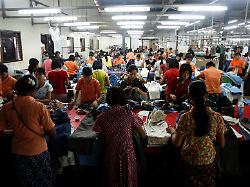‘Deeply Concerned’
H&M examines its own suppliers from Myanmar
08/16/2023 11:49 am
Many well-known fashion chains have their clothes produced in Myanmar. However, working conditions in the factories are said to have deteriorated massively since the military junta took power. The Swedish group H&M is now announcing consequences for the allegations.
The Swedish clothing group H&M is scrutinizing its suppliers in Myanmar for possible violations of labor law. All of the cases mentioned in the report by the non-governmental organization Business and Human Rights Resource Center (BHRRC) would be controlled and remedied if necessary by the local H&M team and in close cooperation with relevant stakeholders, the group said. H&M is the second largest fashion company in the world after Zara’s parent company, Inditex.
“We are deeply concerned by the latest developments in Myanmar and see increasing challenges in managing our operations in accordance with our standards and requirements.” Human rights group BHRRC has been pursuing allegations of workers’ rights violations in garment factories since the military junta took power in Myanmar just over two years ago, plunging the country into a political and humanitarian crisis. This involves a total of 156 cases of abuse in 124 different factories. 21 cases are said to have happened with Inditex suppliers and 20 with H&M suppliers.
According to the Reuters report, wage cuts and wage theft were the most commonly reported offences. BHRRC said the organization relied on sources such as union leaders, international and local media such as Myanmar Labor News in the cases mentioned. She tries to verify the reports by consulting companies and interviewing workers. Reuters could not verify that.
EU relies on imports from Myanmar
The textile industry is an important sector of the country’s economy. Western fashion groups have come under increasing pressure to withdraw from the low-wage country. After Primark and Marks & Spencer, the Spanish Inditex recently announced that it would cut its relationships with suppliers from Myanmar.
H&M is among 18 brands participating in the European Union-funded MADE project, which aims to improve working conditions in Myanmar’s garment factories. The EU’s position is that companies should continue to source clothing from Myanmar, where the industry is a major employer with more than 500 factories producing clothes and shoes for big brands.
“By getting involved as a company in discussions with local labor rights groups and unions about wages and working conditions, you can have an impact,” said Karina Ufert, executive director of the European Chamber of Commerce in Myanmar. “When you leave the country, it’s difficult to see how you can influence local conditions.”
